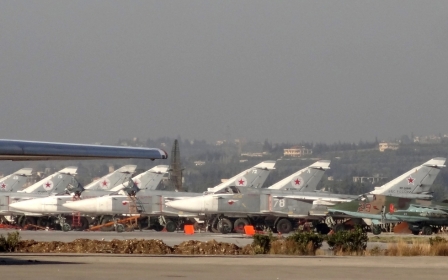Aleppo battle rages hours after US and Russia agree ceasefire plan
Fighting raged in southern Aleppo on Saturday, the Syrian army and rebels said, hours after the United States and Russia hailed a breakthrough deal to put Syria's peace process back on track.
The army attacked rebel-held areas, pushing to maximise recent gains before a new nationwide ceasefire was due to come into effect on Monday. Rebels said they were planning a counter offensive.
Years of fighting in the divided northern city, Syria's biggest before the civil war, have killed thousands of people and left residents struggling to get food and water.
The latest violence came hours after Russia and the US announced a ceasefire plan across Syria which is due to be in force on Monday. Violence in Aleppo has scuppered previous peace efforts.
The army and pro-government militias pushed from the city's the Ramousah area towards rebel pockets in the Amriyah district, both sides said.
"The fighting is flaring on all the fronts of southern Aleppo, but the clashes in Amiryah are the heaviest," said Captain Abdul Salam Abdul Razak, the military spokesman of the rebel Nour al-Din al-Zinki Brigades.
Recent government gains in Ramousah have reopened the main route into the government-held west, and let forces backing President Bashar al-Assad encircle the city's rebel-held east.
An MEE correspondent inside Aleppo reported "many air raids" in the city on Saturday, including in Bustan al-Qasr, al-Ferdous and Mashhad. He said there were at least 30 casualties, including two dead.
Meanwhile, reports emerged of an attack on a market in Idlib on Saturday, with up to 20 people killed.
Ceasefire plan agreed
The United States and Russia, backing opposing sides in the war, announced a deal in the early hours of Saturday including a nationwide ceasefire effective from sundown on Monday, improved aid access and joint targeting of banned militant Islamist groups.
Washington has said indiscriminate bombing of civilians by the Syrian army would have to end under an enforceable deal.
John Kerry, the US secretary of state, said on Friday he had agreed with Russia "an arrangement we think has the capability of sticking".
Standing by his Russian counterpart, Sergei Lavrov, after a day of talks in Geneva, Kerry said he believed the plan would lead to talks to "stop the conflict".
He said the agreement would prevent the air forces of Assad from flying combat missions anywhere that the opposition was present, calling this provision the "bedrock of the agreement" and labeling Assad's air force the "main driver of civilian casualties" and migrant flows.
"That should put an end to the barrel bombs, an end to the indiscriminate bombing of civilian neighbourhoods," Kerry said.
He said the truce will come into force on Monday, the first day of the Muslim holiday of Eid al-Adha, and that if it holds for seven days, the US would begin cooperation with Russian forces in targetting militants of the the Nusra Front and Islamic State (IS) group.
"Going after Nusra is not a concession to anybody, it is profoundly in the interest of the United States to target al-Qaeda," he said.
"If groups within the legitimate opposition want to retain their legitimacy, they need to distance themselves in every way possible from Nusra and Daesh [IS]."
Lavrov said that despite continuing mistrust, the two sides had developed five documents that would enable coordination of the fight against terrorism and a revival of Syria's failed truce in an enhanced form.
"This all creates the necessary conditions for resumption of the political process which has been stalling for a long time," Lavrov said on Friday.
He said Moscow could not "100 percent guarantee" that all the parties would obey the ceasefire.
"The Syrian government has been informed by us about these arrangements, and it is ready to fulfil them," he added.
The HNC, the main opposition political bloc in Syria, said on Saturday that it welcomed the deal "if it is going to be enforced".
The onus was on Russia as its influence "was the only way to get the regime to comply," her statement added.
Turkey has also welcomed the truce. "We welcome the agreement," the Turkish foreign ministry said in a statement, adding that it was essential that fighting was halted across Syria and humanitarian aid reaches those in need "from the first day" of the ceasefire.
Stay informed with MEE's newsletters
Sign up to get the latest alerts, insights and analysis, starting with Turkey Unpacked
Middle East Eye delivers independent and unrivalled coverage and analysis of the Middle East, North Africa and beyond. To learn more about republishing this content and the associated fees, please fill out this form. More about MEE can be found here.




